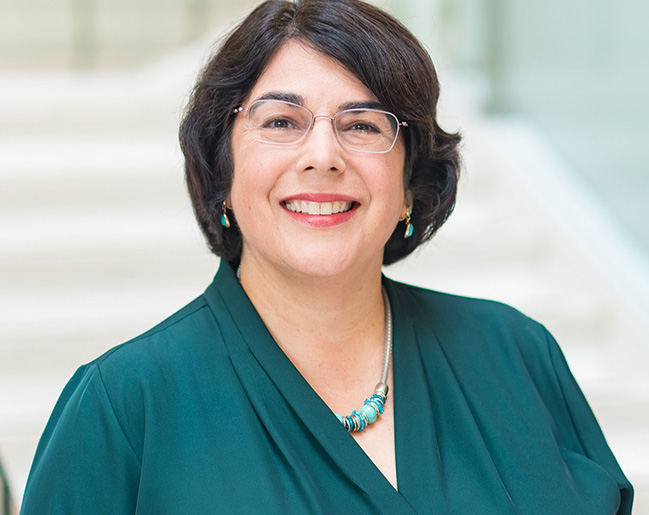
Professor Kleiman Wraps Up Four Years as Co-Chair of ICANN's Rights Protection Mechanisms Policy Development Process Working Group
January 26, 2021
Professor Kathryn Kleiman, together with Co-Chairs Philip Corwin of Verisign and Brian Beckham of the World Intellectual Property Organization, steered the largest policy review group at the Internet Corporation for Assigned Names and Numbers (“ICANN”) to its final report and presentation of 35 changes and improvements for policies to protect trademarks and free speech.
ICANN, a private not-for-profit corporation based in California, manages and oversees the global domain name system pursuant to rules created by ICANN’s “Multistakeholder Process” (a diverse group of businesses, registries, registrars, and noncommercial interests which debate, propose, and now review domain name policies). The group assembled four years ago in the Review of All Rights Protection Mechanisms Policy Development Process Working Group (“RPM WG”) to review and evaluate three sets of policies created in the late 2000s for new Generic Top Level Domains (“new gTLDs”). The policies reviewed were:
- the Uniform Rapid Suspension system (“URS”), a domain name suspension process which offers a fast, cheap and narrowly-tailored path to domain name suspension in new Generic Top Level Domains (“new gTLDs”);
- the Trademark Clearinghouse (“TMCH”) a database currently run by Deloitte and overseen by ICANN that reviews and stores national-registered trademarks for special early-registration and notice periods in the new gTLDs;
- the Trademark Post-Delegation Dispute Resolution Procedures (“TM PDDRP”), special process for challenging registries of new gTLDs that are alleged to be using their gTLDs to actively support trademark infringement.
These rules were created in the late 2000s to support the application for and roll-out of thousands of new gTLDs by ICANN. In 2012, ICANN received almost 2000 applications for new gTLDs and approved over 1200 of them, including for .ninja, .xyz, and .wine. All new gTLD registries agreed by contract to operate their registries pursuant to the rules and procedures above. Prior to the introduction of new rounds of gTLDs – expected in the next 2-3 years – ICANN’s GNSO Council created the RPM WG to review whether these new gTLD rights protection mechanisms were “fit for purpose” and operating according to plan.
After an unexpected four years of intensive work, the RPM WG offered 35 recommendations to clarify, streamline and improve the URS, TMCH and its associated processes, and the TM-PDDRP. The Final Report provides the language of each recommendation, and the Working Group’s rationale. Recommendations include wording to clarify the language (and translations) of URS proceedings, change filing requirements in light of GDPR-related redactions to the domain name registration data, require each URS Provider to maintain a publicly available list of Examiners and their CVs as well as to publish “conflict of interest” policies, and set a process to change the language of “trademark notices” to potential registrants to be clearer and more accessible.
The only “Minority Statement,” a long-standing tradition of ICANN proceedings, was written by Professor Rebecca Tushnet of Harvard Law School, Mitch Stoltz of the Electronic Frontier Foundation, and other attorneys in the domain name industry. Starting on page 131 of the Final Report, it points out the absence of a “satisfactory definition of ‘Word Mark’” in the Final Report and argues that Deloitte’s acceptance of text + design marks (and “extraction of words from design marks”) must be reversed. The Trademark Clearinghouse practices “violate the fundamental promise that the TMCH would not expand rights but would rather only recognize existing rights.”
The Final Report of the RPM Working Group can be found athttps://community.icann.org/display/RARPMRIAGPWG/RPM+PDP+Phase+1+Final+Report
The GNSO Council likely will put the Final Report out for comment shortly and start the charter for Phase 2 of the RPM WG. Phase 2 will review the Uniform Rapid Suspension Policy for the first time since its adoption in 1999 as ICANN's very first "consensus policy."
On January 11th, the GNSO Council thanked Kleiman, Corwin and Beckham, and GNSO Council liaisons John McElwaine and Paul McGrady for their work.